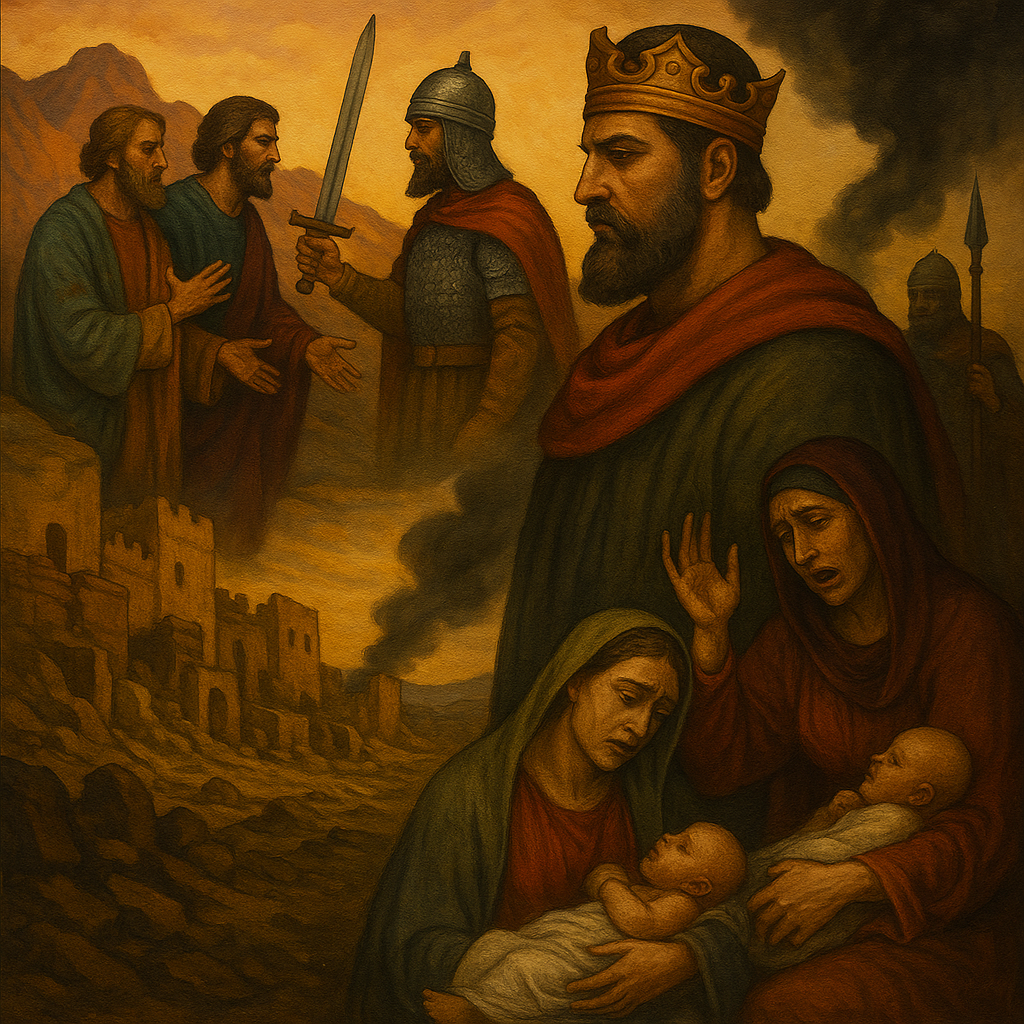
The Edomites, descendants of Esau, the brother of Jacob (Israel), occupy a significant and troubling role in the biblical narrative. Though kin to Israel by blood, Edom’s history is marked by enmity, betrayal, and violence against God’s chosen people. This hostility reaches back to the time of the Exodus and ultimately results in divine judgment. Even into the New Testament, the shadow of Edom’s treachery reappears in the figure of Herod the Great.
Edom’s Refusal During the Exodus
As the Israelites journeyed from Egypt to the Promised Land, they approached the land of Edom and sent messengers to request peaceful passage. Moses appealed to the king of Edom respectfully, citing their shared ancestry through Esau and promising not to take anything from the land, not even water (Numbers 20:14–17).
Despite the peaceful and brotherly request, Edom responded with military threat:
“But Edom said to him, ‘You shall not pass through, lest I come out with the sword against you.’”
— Numbers 20:18
This was more than a diplomatic refusal. In the context of Ancient Near Eastern kinship obligations, Edom’s actions were a grave violation. The Edomites rejected their familial duty and denied aid to a brother nation in need. This offense was not forgotten and laid the groundwork for future judgments pronounced by the prophets.
Edom’s Betrayals in Israel’s Crisis
The tension between Israel and Edom continued to grow. During later periods of Israel’s history, especially during the Babylonian conquest of Jerusalem, Edom again acted in treachery. Rather than offering aid or refuge to their relatives, they allied with the enemy and rejoiced in Israel’s downfall. The prophet Obadiah condemns their actions in vivid detail:
“On the day that you stood aloof, on the day that strangers carried off his wealth… you were like one of them.”
— Obadiah 1:11
Edom looted Jerusalem, blocked escape routes, and handed over fleeing survivors to the Babylonians (Obadiah 1:13–14). These acts were not only cowardly but bloodthirsty and vindictive, and they became the basis for God’s prophetic declaration of Edom’s destruction:
“For the violence done to your brother Jacob, shame shall cover you, and you shall be cut off forever.”
— Obadiah 1:10
Divine Judgment on Edom
Edom’s pride and cruelty brought about its downfall. In Obadiah’s prophecy and other texts (Isaiah 34, Ezekiel 35), Edom is portrayed as a nation drunk with violence and arrogance, believing it was untouchable due to its mountainous strongholds. But God declared that Edom would be brought down from its heights and made desolate.
By the time of the Maccabees and into the Roman period, Edom, now known as Idumea, was a weakened shell of its former self, but its spiritual legacy of opposition had not faded.
Herod the Edomite: A False King Over Israel
This legacy reaches a climactic moment in the New Testament through Herod the Great, a descendant of the Edomites (Idumeans), who had been forcibly converted to Judaism generations earlier. Though Herod ruled Judea, his authority came from Rome, not from the line of David or divine appointment.
When wise men came seeking the newborn “King of the Jews,” Herod was threatened. He responded with deceit and slaughter, ordering the massacre of the innocents in Bethlehem (Matthew 2:16). In doing so, he echoed the long-standing hostility of Edom—opposing God’s chosen and attempting to cut off the messianic line.
Herod’s Edomite lineage is no coincidence. It symbolically places him in the long tradition of opposition to Israel’s covenantal destiny. He was a usurper on the throne, echoing Esau’s desire to reclaim the birthright that had been given to Jacob.
Theological Implications and Enduring Lessons
The story of Edom is a cautionary tale. Despite being kin to Israel, they consistently chose the path of pride, vengeance, and betrayal. Their rejection of kinship responsibilities, celebration of Israel’s misfortunes, and alignment with God’s enemies brought about their destruction. Their legacy culminated in Herod, an Edomite ruler who sought to destroy the Messiah himself.
This arc—from Exodus to Herod—demonstrates that betrayal from within the family of nations is especially grievous. God’s judgment of Edom was not arbitrary but based on their persistent violence and covenantal unfaithfulness.
Discussion Questions
- Why is Edom’s refusal to allow Israel passage during the Exodus seen as such a serious offense in Scripture, and how does this reflect the expectations of kinship in the Ancient Near East?
- How does Obadiah’s prophecy against Edom reflect broader biblical themes of justice and covenant loyalty?
- What is the significance of Herod the Great being an Edomite, and how does this connect to the ongoing hostility between Edom and Israel in biblical history?
- How does Edom’s betrayal during the Babylonian invasion foreshadow future judgments and deepen their guilt before God?
- In what ways can Edom’s legacy serve as a warning to nations—or individuals—who betray those they are called to protect or support?
Want to Know More?
- Obadiah (Anchor Yale Bible Commentary) – Paul R. Raabe
A scholarly, detailed exploration of Obadiah, focusing on the historical betrayal by Edom and the theological implications of its judgment. - The IVP Bible Background Commentary: Old Testament – John H. Walton, Victor H. Matthews, and Mark W. Chavalas
Offers cultural and historical background on Edom’s role in the Exodus and broader biblical narratives. - Edom and the Edomites – John Bartlett
A comprehensive study of Edom’s historical development, religion, and hostile relationship with Israel. - Herod: King of the Jews and Friend of the Romans – Peter Richardson
Investigates Herod’s Idumean (Edomite) lineage and the political and theological tensions surrounding his reign over Judea. - Zondervan Illustrated Bible Backgrounds Commentary: Old Testament, Volume 1 – Edited by John H. Walton
Provides visual and historical context for passages involving Edom, particularly Numbers 20 and the Exodus period.





